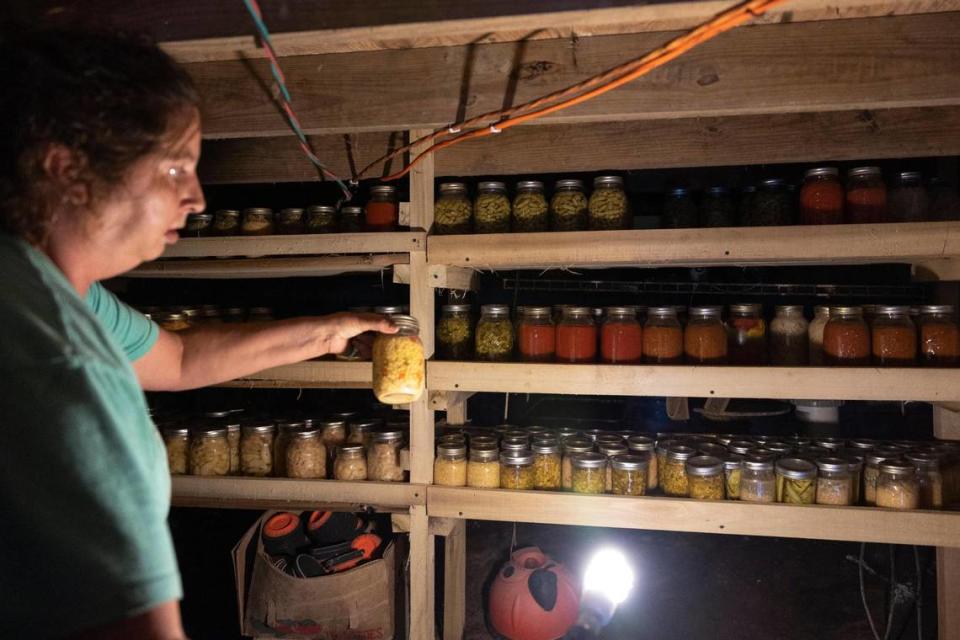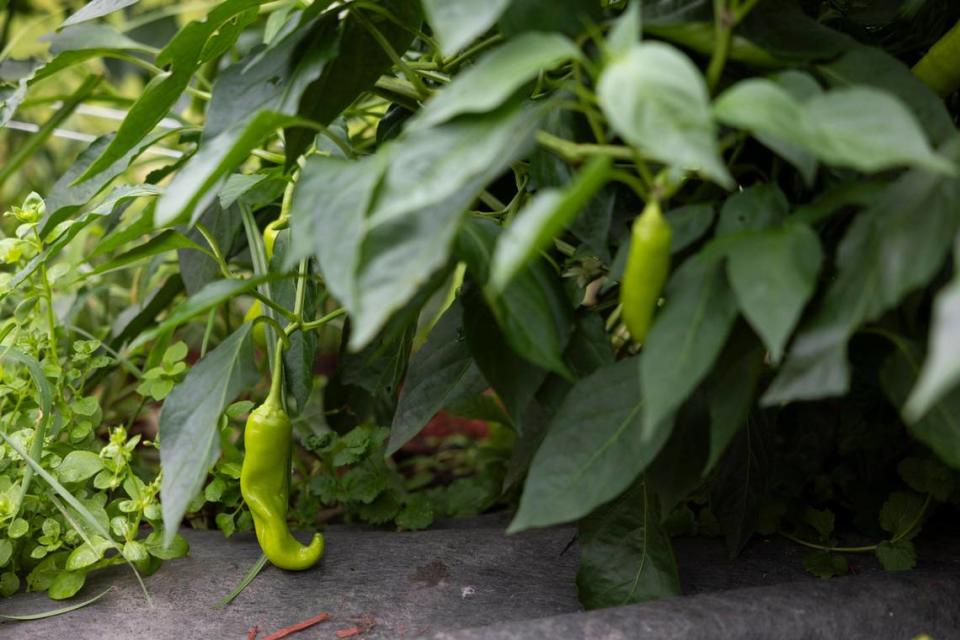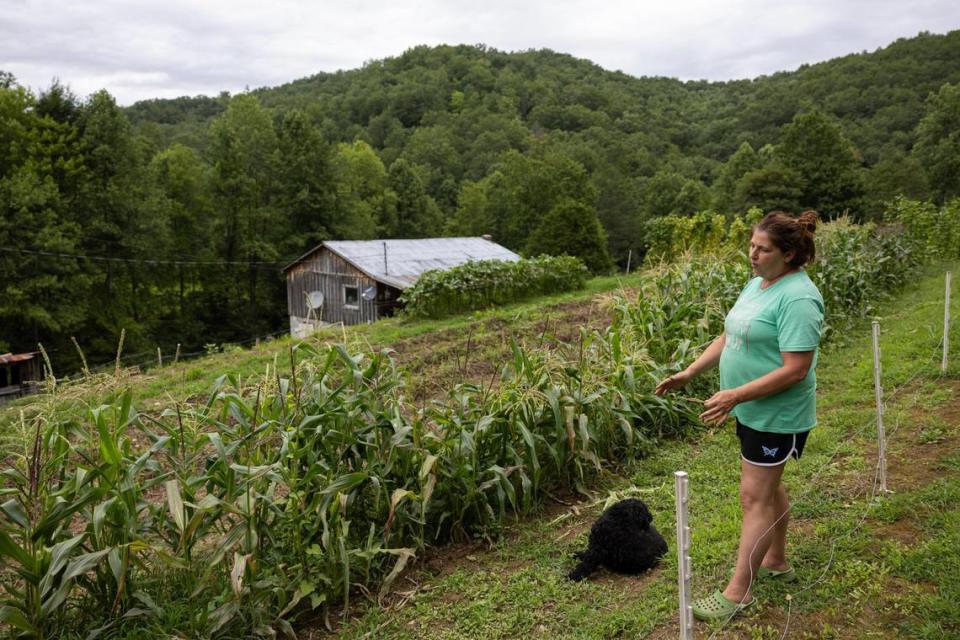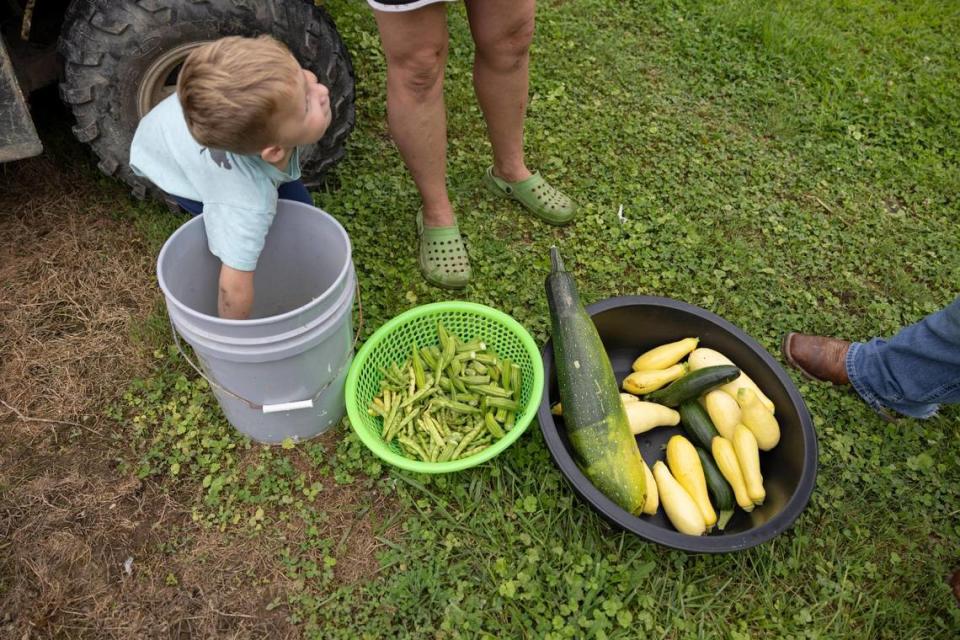‘You won’t go hungry.’ Could gardening be an answer to Eastern Ky. food insecurity?
Maurica Cornett’s father often repeated an important maxim: “You have a garden, you won’t go hungry.”
“He was right,” Cornett said.
For most of her life, Cornett or a family member has raised a garden large enough to help support their family. On roughly four acres of land in southwestern Letcher County, Cornett has this year raised head-sized sunflowers, dozens of tomato and pepper plants ornamented with bulbous fruit, and rows of bean plants supported by poles.
Her basement is a library of preserved produce that would rival a local grocery store. Shelves of canned green beans, relishes and sauces ensure her family gets at least a taste of their yard year round. Last year, Cornett said she made 130 jars of jelly from berries found near roadsides and on old strip mines.
“It takes a whole lot to make 130 and it still didn’t use all the berries,” Cornett said. She rarely has to buy produce.
Rising food prices and a sudden cut off of COVID-related federal benefits have made it harder for many in Eastern Kentucky and in other rural areas of the state to access healthy, nutritious foods.
While local pantries work to bridge the access gap by providing food, other nonprofits and researchers are trying to provide more ways for folks to grow or buy more of their own produce locally.

From farmers to miners
Nurturing gardening skills as a way to improve food security asks Eastern Kentuckians to reach back to cultural roots that predate the region’s decades of coal booms, Jason Brashear, interim director of the Pine Mountain Settlement School, said.
Before coal, many people in the mountains survived and thrived on subsistence farming, he said.
“If we go back in our history 75 years ago, everybody gardened,” said Brashear, a Perry County native who has worked at improving mountain agriculture for much of his career. “Everybody had some sort of a farmstead that they produced the majority of the food that they ate in the year.”
But when the economy changed and grocery stores became more common, Eastern Kentucky “went to this convenience culture” much like the rest of the world, he said.
“We kind of clung to that identity of you know, we’re coal miners, we’re not farmers,” Brashear said.
Over time that cultural shift meant food preservation and farming techniques weren’t passed down, and some of that generational knowledge began to disappear, Brashear said.
A recently published University of Kentucky study, which interviewed 59 Martin County residents in 2021, observed a similar shift.
“My grandmother always kept a garden, but ... my mom and aunts and stuff didn’t develop that skill,” one study participant told researchers. “That’s something I would love to be able to do, but, if there was a program like at the high school to maybe implement this stuff, it would keep going like after my generation.”

Last fall, Logan Sizemore became the youngest person ever elected in state history, earning a spot on his county’s soil and water district conservation board as a high schooler. He’s been passionate about getting more youth involved with agriculture and said a Future Farmers of America program and agriculture classes started at his high school this year.
Sizemore, who attends Leslie County High School, has long been an avid gardener. He and the mayor of Hyden started a community garden in the town’s park where anyone can get free vegetables.
“I know there’s some people in our county that can’t either grow a garden or just can’t afford the produce that I’m growing in supermarkets,” Sizemore said.

Returning to gardening
One program that has helped many “return back to gardening” is Grow Appalachia, Brashear said. For over 13 years, the Berea College strategic initiative has partnered with nonprofits in multiple states to provide seeds and other gardening supplies needed to make an organic garden, as well as the education on how to actually grow and preserve that produce.
“Having the resources is a huge barrier to learning how to garden,” said Candace Mullins, the executive director of Grow Appalachia. “It’s expensive to buy hose, seeds, fertilizer, plants — I mean, you could easily spend $1,000 trying to get a garden going for a new gardener.”
Since Grow Appalachia started, over 7,000 families have participated and harvested nearly 7 million pounds of produce, Mullins said.
The Pine Mountain Settlement School has been a Grow Appalachia partner since 2010 and so far this growing season, they have 45 families involved in the program who have produced over 14,000 pounds of produce. Along with receiving supplies, they also participate in educational meetings at the school.
Being able to access fresh food is perhaps just as big of an obstacle as affording it. The Pine Mountain Settlement School, and much of the local population it serves, is about a 20-30-minute drive from grocery stores in nearby communities like Harlan or Cumberland — both small towns along Kentucky’s southeastern border with Virginia.
“It’s not walkable,” Brashear said, noting that much of rural Kentucky is considered a food desert. “You got to have a vehicle to get there.”

According to 2019 USDA data, 608 households sit in the same census tract as the settlement school. Of those households, 109 lack a vehicle and live over half a mile from a supermarket.
Closer by, there’s gas stations and dollar stores that might offer small staples like eggs but not much in the way of fresh food, Brashear said. Even at the grocery store, produce options could be limited. In Cumberland, Brashear said the produce section isn’t much larger than two office desks pushed together.
Those families participating in the Grow Appalachia program are diverse in age and size — some are couples while others might have a few kids, said Ashley Lewis, an educator and Grow Appalachia coordinator at the Pine Mountain Settlement School. They’re also diverse in experience, some are beginners while others, like Cornett, are prolific growers.
They’re also drawn to the program for a variety of reasons. Close to a quarter of the participants grow their gardens “out of need” for the food, Brashear estimated. Many others grow out of a “strong want,” he said. After seeing mass panic at grocery stores at the onset of the COVID-19 pandemic, many wanted more control over how they get their food. Cornett said she joined for the social benefits.

More than just growing food
A University of Kentucky research project, called Laurel HARVEST, aims to educate Laurel County residents on how to cook nutritious meals. Kathryn Cardarelli, a UK faculty member in the College of Public Health leading the project, said the multi-year study offers a blend of in-person and Zoom sessions on topics like preparing food, eating healthy on a budget and reading labels.
Researchers will then analyze the nutrition patterns of those involved to see if the sessions made an impact on how they eat. They’ll also work with nearby food banks to learn more about how food is accessed locally. Early results — which Cardarelli stressed was just from their first participants and too small a sample size — showed that the study participants improved their ability to prepare a nutritious meal.
The project focuses on low-income families with children and grandparents raising grandchildren. The direction and educational sessions were recommended to the research team by a Laurel County community action board.
While Lexington boasts the state’s largest farmer’s market, many rural markets in Kentucky have seen a precipitous decline in the number of growers selling at the market, Cardarelli said. That’s a symptom of the decline of small-scale farm families nationwide.
Still, some markets have been able to navigate immense challenges while also working to improve food security in their communities. The Whitesburg Farmer’s Market in Letcher County has battled back from last summer’s flood to still offer not only the market but also a collection of “incentive” programs that makes it more accessible to those with lower incomes.

According to Louise Murtaugh, the market’s manager, those programs include Kentucky Double Dollars, a Community Farm Alliance program that provides SNAP recipients and local seniors money they can spend at the market. The health department there runs a similar program for households with children.
Additionally, a FARMacy program gives a $35 weekly prescription of fruits and vegetables from the market to those who might have hypertension, diabetes or obesity. That program is sponsored by a grant from the Mountain Comprehensive Health Corporation.
Valerie Horn, the board chair of the market and also the director of the Cowan Community Center in Whitesburg, said she’s seen an increase in interest in people getting their food locally. After the pandemic and last year’s deadly flood, some just want more control.
“After the flood, and after the pandemic, I think we’ve had two strong lessons and are potentially more committed to growing our own food and beyond,” said Horn, who was selected for a James Beard Leadership Award this summer.

Want to help or get involved?
Many of the nonprofits mentioned accept donations and are listed below along with related organizations. Getting involved with a Grow Appalachia program locally would require contacting the local partner nearest you. Those partner organizations are listed here.
CANE Kitchen Inc., a commercial kitchen in Whitesburg that serves meals to the community.
Find a food bank near you
Find a summer meal program near you

